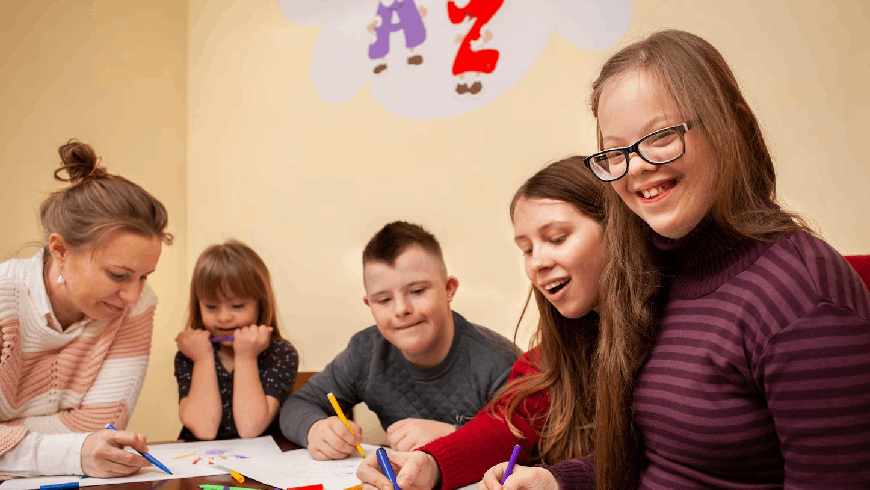Common Learning and Behaviour Challenges in Kids with VCFS
Velocardiofacial Syndrome (VCFS) which is also known as 22q11.2 deletion syndrome is a genetic condition that affects multiple systems within a person’s body, including their heart, immune system, palate and brain. The learning and behavioural issues these children face, are a big concern for their families as it can influence their education, social interactions and daily lives. But the right help and understanding can teach these children to thrive.
This blog, will look at the common learning and behavioural challenges that children with VCFS experience as well as, how families and educators can assist them in getting over them. It will also discuss the significance of community links and
support groups in Queensland which may provide guidance, resources and encouragement to families and anybody seeking help or information about the condition.
- Face Learning Difficulties in the Classroom
Children with VCFS often face a unique learning profile. While many of the children will have an average level of intelligence, specific cognitive deficits can occur in them, especially in the areas of visual spatial reasoning, working memory and executive functioning; all of which can make normal schooling quite challenging. They may face difficulty with subjects like math, reading comprehension and problem solving as they need more time to comprehend material; and tend to do better with structured /visual learning methods.
Teachers ought to be aware of these challenges and need to adjust their instructional approach accordingly. A personalised, learning plan, like Individualised Education Plan (IEP) is required to support these kids in their academic growth.
- Experience Speech and Language Delays
Speech and language development in children with VCFS, is frequently hampered, by structural variations in the palate and neurological issues. These delays can result in difficulty forming sounds, reduced vocabulary and trouble in understanding complex instructions. This may lead them to experience frustration or behavioural outbursts, especially when they are in social or classroom settings. For this, speech therapy plays a critical role in giving some much
needed early intervention. With consistent support these children will be able to make big gains in both clarity and comprehension.
- Decreased Attention and Increased Hyperactivity
Attention deficit/ hyperactivity disorder (ADHD), is frequently found to be present, in children with VCFS. The visible symptoms may include restlessness, impulsivity, difficulty concentrating and a short attention span. These traits can interfere with both learning and social interactions, particularly when they have to participate in environments that require sustained focus.
Behaviour management strategies, clear routines, and sometimes medication can help manage these symptoms. Teachers and parents too should work closely with these children to create consistent expectations across home and school environments.
- They Face Anxiety and Social Difficulties
Children with VCFS frequently exhibit anxiety especially in novel or difficult environments. Poor communication skills or a difficulty reading social signs, can also cause social issues. These children may look shy, introverted or unduly concerned about changes or disruptions in their usual routines.
Hence, creating a safe, predictable environment and encouraging gentle social interaction is paramount for them, as it can help reduce anxiety feelings in them. Many families find comfort in connecting with support groups in Queensland, where they can share experiences and coping strategies with others in similar situations.
- Emotional Regulation and Behavioural Outbursts
Children with VCFS often experience frustration, sensory sensitivities, or difficulty expressing needs causing them to develop emotional dysregulation. When a child feels overwhelmed or misunderstood,
meltdowns, aggression, or withdrawal too may occur. Parents and carers can help them by identifying their triggers and teaching calming techniques. Support from occupational therapists or behavioural specialists are often beneficial as they help them in developing self regulation strategies.
- The Importance of Early and Ongoing Support
Early identification and intervention, are critical to assisting children with VCFS in reaching their full potential. This could include a variety of therapies (speech, occupational and psychological), as well as close collaboration between families, schools and healthcare providers.
Furthermore, participation in support groups may provide families with the opportunity to access resources, attend workshops and establish relationships, with others who are going through similar circumstances. These networks offer, both practical help and emotional support.
- Working Together: The Role of Families and Schools
Success in addressing learning and behavioural challenges in children with VCFS typically requires strong coordination among families, schools and healthcare providers. Teachers, have an important role, in identifying early symptoms of difficulties, modifying teaching tactics and keeping open communication with parents. Similarly, parents can provide information on their child's triggers, strengths and growth outside of school. Regular meetings, agreed goals and a supportive team approach, guarantee that the child receives continuous support in all aspects of life.
Wrapping Up
While VCFS, presents a variety of academic and behavioural issues, it is important to recognise that each child is unique. With a little patience, targeted instruction and strong support from family and community, children with this disease can excel in school and beyond. Recognising the unique challenges that children with VCFS confront, is the first step towards providing a loving and supportive environment for them.


